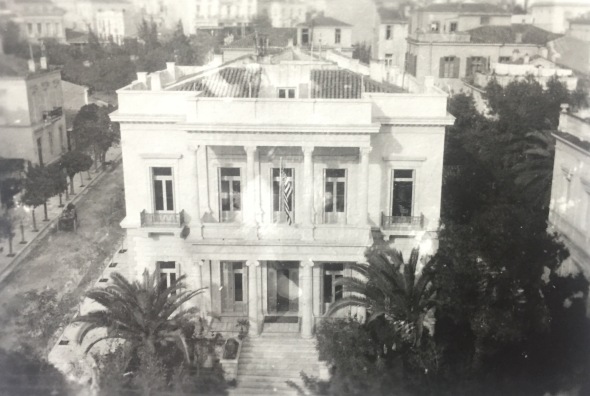Professors to the Rescue: Americans in the Aegean at the End of the Great War, 1918-1919.
Posted: January 3, 2019 Filed under: Archival Research, Biography, History of Archaeology, Philhellenism | Tags: A. Winsor Weld, American Red Cross Greek Commission, Cyril G. Hopkins, Edward Capps, Henry B. Dewing, Horace S. Oakley 4 Comments“Islands and coast Asia Minor still crowded with refugees. Stop. Number there still to be repatriated estimated three hundred thousand. Stop. We are maintaining three stations in Mytilene district clothing alone being available, but food urgently needed. Stop. Above statements based on personal inspection this Commission. Stop. We recommend that work in Aegean be immediately extended to other islands like Chios, Samos and to opposite coast which can be reached by sea transport which can be secured by Greek governments. Stop.”
The text quoted above is a small portion of a long telegram (47 lines) that Colonel Edward Capps sent to Harvey D. Gibson, member of the American Red Cross War Council in Paris, on December 12, 1918 (NACP, Greece, ARC Commission to, 964.62/08). The telegram reported the activities of the American Red Cross (ARC hereafter) since arrival of its Greek Commission in Athens on October 23rd.
 This is not the first time I am writing about the activities of the ARC in Greece. In 2011, together with Jack L. Davis, then Director of the American School of Classical Studies at Athens (ASCSA or the School hereafter), we organized and subsequently published the proceedings of a conference titled Philhellenism, Philanthropy, or Political Convenience: American Archaeology in Greece (Princeton 2013). Davis’s paper, “The American School of Classical Studies and the Politics of Volunteerism,” discussed the involvement of members of the ASCSA, through enlistment in the Greek Commission of the ARC, in humanitarian aid in eastern Macedonia, as well as in the repatriation of Greek citizens who had been taken as hostages to Bulgaria. Later in 2015, on the occasion of the centenary of the Battle of Gallipoli, I was invited to participate in a conference about The First World War in the Mediterranean and the Role of Lemnos, with a paper that discussed the humanitarian activities of the ARC Greek Commission in the eastern Aegean at the end of the Great War. Read the rest of this entry »
This is not the first time I am writing about the activities of the ARC in Greece. In 2011, together with Jack L. Davis, then Director of the American School of Classical Studies at Athens (ASCSA or the School hereafter), we organized and subsequently published the proceedings of a conference titled Philhellenism, Philanthropy, or Political Convenience: American Archaeology in Greece (Princeton 2013). Davis’s paper, “The American School of Classical Studies and the Politics of Volunteerism,” discussed the involvement of members of the ASCSA, through enlistment in the Greek Commission of the ARC, in humanitarian aid in eastern Macedonia, as well as in the repatriation of Greek citizens who had been taken as hostages to Bulgaria. Later in 2015, on the occasion of the centenary of the Battle of Gallipoli, I was invited to participate in a conference about The First World War in the Mediterranean and the Role of Lemnos, with a paper that discussed the humanitarian activities of the ARC Greek Commission in the eastern Aegean at the end of the Great War. Read the rest of this entry »
Athens 1918: “In Every Way a Much More Attractive City than Rome”
Posted: December 1, 2015 Filed under: Archival Research, History of Archaeology, Modern Greek History | Tags: 1918-1919, A. Winsor Weld, American Red Cross Greek Commission, American School of Classical Studies at Athens, Aspasia Manou, Athens, Edward Capps, Great War, Greek Cuisine, Josephine Kelly, Kephissias Street, King Alexander of Greece 4 Comments
The headquarters of the American Red Cross in Athens, 1918-1920. Source: Horace S. Oakley Papers, Newberry Library, Chicago.
This description of Athens was penned by A. Winsor Weld (1869-1956), one of the deputy commissioners of the American Red Cross Commission to Greece, a few days after his arrival in October 1918. Weld, an investment broker from Boston and a graduate of Harvard University (B.A. 1891), was one of a million Americans who responded to President Wilson’s call to provide military and civilian aid to many European countries at the end of WW I. The mission to Greece was organized in June and July of 1918 in response to an appeal from the Greek Red Cross (Capps 1919, 9).
There came from America to do the work 103 persons (60 men and 43 women), and several others were recruited in Europe. They enlisted in the service of the American Red Cross from all parts of the United States, and represented all manner of occupations and professions. There were business men, lawyers, bankers, physicians, preachers, teachers, farmers and mechanics, and among the women, trained nurses, stenographers and social workers. The authority of the Commission was vested in the Commissioner, who held the rank of Lieutenant-Colonel, and seven Deputy Commissioners with the rank of Major.

